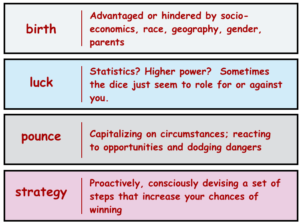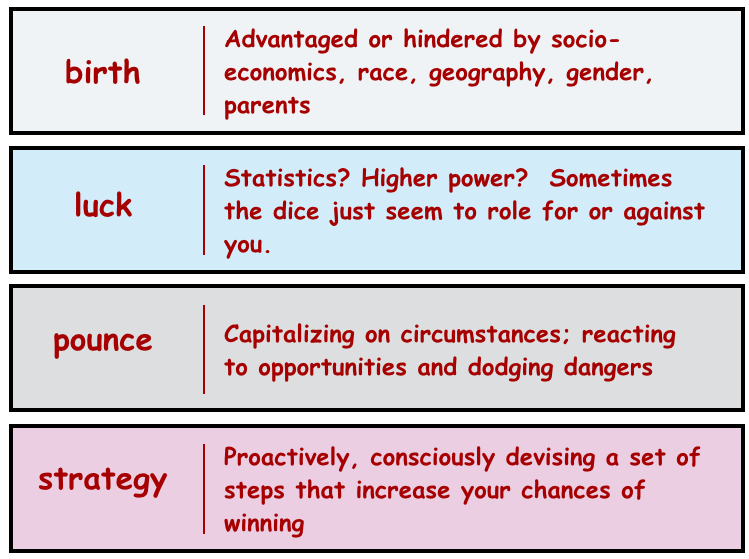Over a relaxing holiday break I had plenty of un-scheduled time to just hang out with family. As I get older, hopefully a bit more reflective and a smidgen wiser, I know how sacred are these times when we set aside our devices and “things we have to do”, and just be together. And play cards. Our family plays card games that don’t require a ton of thought, and we got hooked on a new one this vacation, Five Crowns, where winning is largely based on luck, which means the well of friendly taunting and pouting about the vagaries of luck is nearly bottomless.
 Which somehow got me thinking, one night at about 3 AM, about how people and organizations interact with, and influence, their respective futures…
Which somehow got me thinking, one night at about 3 AM, about how people and organizations interact with, and influence, their respective futures…
I think there are four ways we can influence, hope to influence, are influenced by, or ignore all together, future events. To some extent I think there is hierarchy here; there are increasing levels of proactivity in these four approaches. I don’t think that these come with value judgements; for each person or organization, a pathway to influence the future is more or less needed and appropriate.
- Birth: Unfortunately, people are not born with equal power to influence their futures, at least not in America. All data suggest that race, gender, socio-economic status, parents, and geography are powerful positive boosters or heavy weights on individual aspirations. The same can be said for organizations. Schools have very different “starting points” when it comes to trying to make a change. I wish this were not so, but I am a realist.
- Luck: Should we rely on luck to help us mold the future? Should we place our faith in the statistical probability that we or our school will have as much good luck as bad? Does it help to pray for good luck or the intercession of a higher power? It is sometimes very hard to argue that some people and some groups are just not luckier than others, in cards and in life.
- Pounce: We can create good paths by capitalizing on circumstances. The most effective natural predators react quickly and powerfully to the opportunity of a meal. The most effective prey respond just as quickly to dangers. Neither mentally map out each of those changing conditions, but the best are better when it comes to reacting to changes in the world around them.
- Strategy: Unlike the first four, strategy is about proactively, consciously, devising a set of steps that increase your chances of winning. Strategy has no place in a pure-luck game of cards; it has everything to do with winning at chess or Go.
Does every school need a strategy? The more you can truly rely on the strength of your legacy, your belief in luck, and your ability to pounce at the right time, the less strategy you need. The converse is also true. I have finished a draft of my next book, which is about how schools and school leaders can best compete in an increasingly competitive world, and this four-part simplification will probably find a place in it.
These are stewing newly in my mind and I would love your feedback and discussion! And Happy New Year to all!












Leave A Comment